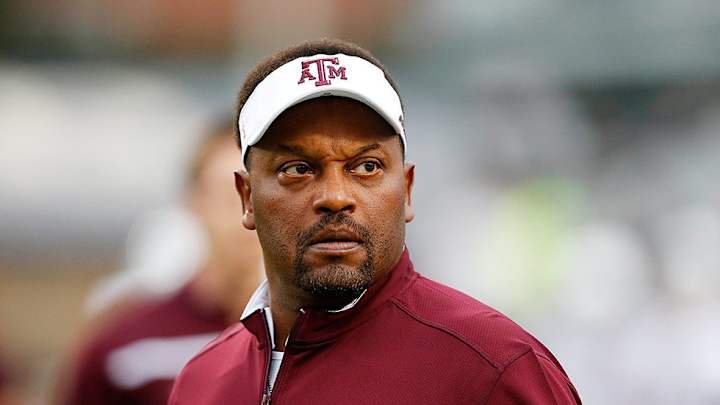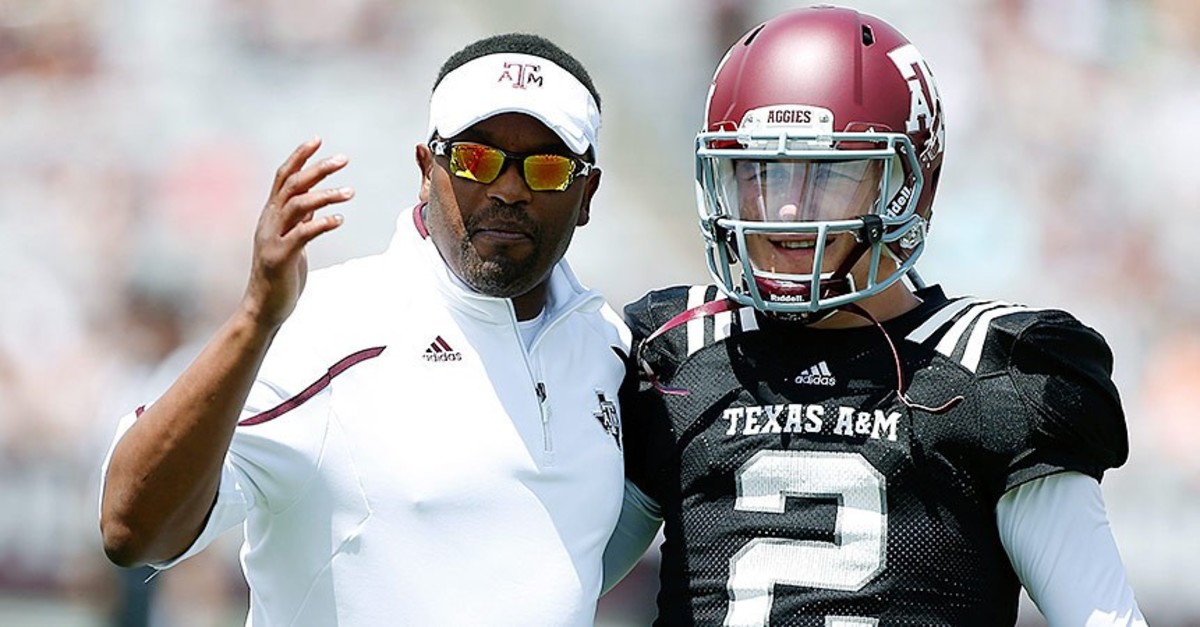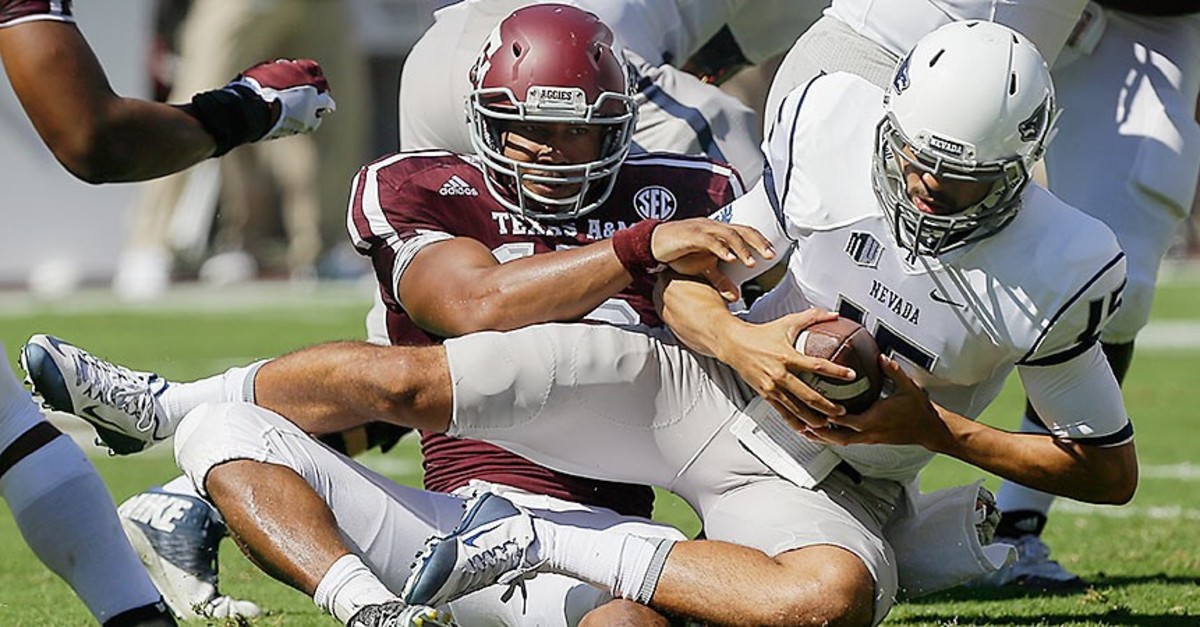Cutting through the noise: Texas A&M's Kevin Sumlin talks Johnny Manziel, state of Aggies program

[video: 13724909]
Texas A&M coach Kevin Sumlin has endured an off-season of transition. The Aggies have a new quarterback (Oklahoma transfer Trevor Knight), a new offensive coordinator (Noel Mazzone, who came from UCLA) and a new athletic director (Scott Woodward from Washington).
Sumlin is 36–16 in four seasons in College Station, but the Aggies are coming off back-to-back 8–5 campaigns. A&M got outscored 109–43 in losses to SEC West foes Alabama, Auburn, LSU and Ole Miss last season. The lopsided results hint that the gap between the Aggies and the rest of the SEC West may be widening.
Sumlin has not been complacent this off-season, with an overhaul of A&M's strength program to add more mass and bulk among the most notable changes. In late March, he sat down in his office for a lengthy interview in which he touched on potential No. 1 pick Myles Garrett, Johnny Manziel, the Aggies' staff changes and his journalistic pet peeve.
Campus Rush:There have been some changes above you here in the off-season. With Scott Woodward here now and some uncertainty with you this off-season, how are things going forward?
Kevin Sumlin: Scott's been great. He's a hands-on guy. He's at practice. He's a "how can I help you?" kind of guy. Obviously from his time at LSU, he understands what the Southeastern Conference is about, and in the end being in the SEC West. So he's no stranger to what we want to achieve or what the challenges are in SEC West. Obviously with what they've done at Washington from a development standpoint, the stadium and all that, it's a good fit.
He comes over to our offices, he talks about recruiting. Wants to [know] how can he help. Whether it's things, challenges that we have or things from a recruiting standpoint to talk to recruits, he's been a guy that's—first day on the job, came by and met head coaches one-on-one. Any chance he gets, he's out at football practice, which is great.
JOHNSON: Texas A&M enters make-or-break stretch to revive recruiting momentum
CR:I read about your father's passing. I know he was regarded as a pioneering coach. Can you reflect on his impact on you?
Sumlin: I had somebody who I respect. [It's] something that you don't get over, you just kind of get used to it over time. More than anything else, it becomes a situation where there's always one guy's opinion that, as he used to say, you can take it for what it's worth. And so, you just don't get that anymore, just the ability to make you think or just to have a conversation about things you're kicking around. Now you know you don't have that person to vent or that person that can tell you maybe [what] you don't want to hear. [laughs] That's what dads are for.
But for him to be able to see some of the things that he never thought were going to be possible was a good thing, and I think he alluded to that in some of the interviews he did. It's never anything that anybody has a plan for. There's been a number of guys that I've texted—like Kirk Herbstreit, [who lost has father] a week later—and so it's part of life, but it's not a part of life; you're not prepared for it. I'm fortunate. I wouldn't be where I am without him, moving and doing some things and putting me in positions to be successful whether I wanted to be part of them or not. But they were the right moves eventually, and hopefully I can have the same effect on my kids as he had on me.

Scott Halleran/Getty Images
CR:I have to ask a token Johnny question.
Sumlin: I just got off a podcast with Bruce (Feldman) and Stewart Mandel. Stewart's always going to hit on that. Yeah, Stewart's like, "Hey, so, I gotta ask." Here's what happens with you (media) guys. The whole "I gotta ask." I tell the local guys, "No, you don't." You really don't. Whenever you lead with "I gotta ask," I know something is coming.
CR:You're correct. We are all pretty transparent.
Sumlin: 'I gotta ask.' Do you really gotta ask?
CR:I do. Any contact with Johnny?
Sumlin: Yeah, I saw him at Mike Evans's wedding. Mike and him have been close, continue to be close, so he was there at the wedding and I spoke to him. I reached out to him a couple of times. It's hard to say, with him being released (from Cleveland) now, what direction that's going to go. I'm not sure what—I don't talk to him every day—but what direction that is headed. I think, obviously, it's working with a new agent and trying to make some contacts. We'll see what happens. Football is such a big part of him and his competitive nature, and to some extent his identity. We'll see where it goes.
Editor's note: Agent Drew Rosenhaus dropped Manziel as a client in April.
CR:You mentioned changing the strength program, which in a football program is a big deal. Why the change?
Sumlin: You got to look at where we are and what we're doing and our body types and what has happened over the last couple of years, from a health standpoint and a physical standpoint in this league. And I think we were able to play a little bit better defense because we were able to rotate a number of guys, but health-wise we still took some hits and guys not really being able to practice a lot toward the end of the year and getting them to the game, instead of them still being able to physically grind and go through those things.
I think that had some effect on how they played and some of the mental errors that happened in games. "Hey look, we got to get this guy out of the game because he's a good player but mentally he wasn't quite as sharp as he was." So that all boils down to what we're doing, not just during that time of the year, but what we're doing now and what that routine looks like from January to January and not just August to January.
And so taking a look at what we're doing in the off-season as far as not just our lifting process we've changed.
CR: How?
Sumlin: Really, still through spring football incorporating a four-day-a-week lift program, even with spring football going on instead of cutting back on lifting during spring football. Reducing the amount of running during that time and concentrating on heavier lifts and strength and our nutrition, just to make sure that strength and mass is maximized throughout the spring instead of just that period that's before spring ball, after spring ball and the summer, and then trying to carry that through the fall, which is a little bit different.
And also trying to utilize some more flexibility training and making that part of the routine instead of just something that we're doing.
CR:So you had been conditioning more up to your tempo and keeping guys in shape. Is this a philosophical change conceding that to keep up in SEC West you need to be big and strong?
Sumlin: Yeah, and you got to recruit to that, too. The last couple of years we have recruited guys [that way]. The five O-linemen that we signed are big guys. Some of the guys that played last year: Daylon Mack at 330 as a freshman, Kingsley Keke, two freshmen defensive tackles were 312, 310 coming in here, and not 290, which gives them opportunity with bigger guys to get them in shape and increase their mass and strength instead of trying to get guys to 310. They're already there, now let's work on them.
Being a tempo team and doing those types of things, your body types change a little bit. But obviously we've got to be able to hold up later on in the year, and I think whenever you're in this position, you're always looking at, all right, what are the issues? And what are we looking to do to fix them? Instead of just saying, Oh, that happened. There's been a concerted effort across the board in different areas to address those problems, and like I said, it's a work in progress, but I like where it is right now.
CR:Did you need to take a step back this off-season and evaluate discipline-wise and culture-wise how the program operates?
Sumlin: I would say this: I think the things that you evaluate culture and discipline on, if you look at the numbers, we have really improved the situation since I've been here. The last couple of semesters have been the highest GPA for a football team at Texas A&M since they kept track of them. Our APR is the highest it has ever been. So the numbers that coincide with discipline and culture, those two numbers jump out.
We had some problems with guys early when I got here. That's not an issue anymore. So the things that coincide with culture and with discipline, with the types of things you want to talk about a program structurally, that's not true. And those numbers bear it out.
As I said before, we're not where we want to be, but over the course of the last four years we won 36 games. That's the most in 20 years here. Is the program better than it was? You bet it is. Is it where we want to be? No, but to say that we haven't made strides at this program is not true.
And to generalize about a program and its discipline, I think the numbers speak for itself about where this program's made strides in wins and where it's made strides in graduating players and where it's made strides in GPA and graduation rates. That speaks to the discipline level of what's going on here.

Bob Levey/Getty Images
CR:Let's transition to Myles Garrett. When I was at the NFL combine, his name came up a lot as a potential No. 1 pick next year. What can he do to polish up his game before going to the NFL?
Sumlin: His technique has improved. That's been a real focus with his pass-rush moves, and utilizing his speed has been his biggest strength. But now, converting and creating some speed-to-power-type moves, instead of being an edge rusher or a slasher inside, which is where he got the majority of his pressures and sacks last year. Now being able to hold the point better against the run, and then people have been attacking him the last few games with basically read—reading him, they're not blocking him. So putting him in those conflicts and having him do some things maybe a little bit differently instead of just "When the ball is snapped, run as fast as I can to the quarterback"—which he does very well.
CR:Your defense struggled last year. Is there a sense of ownership where Myles wants to be the face of the defense and push you guys?
Sumlin: There's no doubt. Right now we're in a good place in the locker room because we've got a number of guys that have played a substantial amount of plays and have had some success. We improved on defense last year. We still need to get better against the run, which has been an effort. I think across the board, when you have two defensive ends like the ones we have, they're really complementary of each other. And the safeties have been really as good as there are across the board, in Armani [Watts] and Justin Evans. Donovan Wilson.
CR:NFL guys loved Wilson, from what I've heard.
Sumlin: Yes. He had shoulder surgery, so he's sitting out (spring ball), but he's a nickel. He's 205 pounds now. So he gives us the ability to be that guy in (defensive coordinator John Chavis's scheme). I'm not going to compare him to that other guy [Chavis had at LSU), that guy (Tyrann Mathieu) is a freak. [Laughs] Wilson is a guy that gets interceptions, loose balls, stripping balls—he's a football player. So really, he has given us that kind of leverage to play nickel and have him be a tackler in the box and also play out in space and cover people with some size and stretch.
Those—I call them three safeties, but they're really two safeties and a nickel—have really helped us. We got to get better at linebacker. And we got a bunch of guys back that are returning. Otaro Alaka sat out last year with injury. [He was] highly recruited, but now he's 240 and can really run, which will instantly give us another guy inside.
BECHT: Get to know new starting QBs for 2016
CR:Obviously your quarterback position has undergone some transition. How's Trevor Knight doing adapting to a new offense, commanding locker room. What have his first few months been like?
Sumlin: He didn't come in and just try to take over. He came in to be a great teammate. He and Jake [Hubenak] are together all the time. Two older guys that have been around. Jake was at Oklahoma State and junior college, so this is his [third] stop. He's been around. Obviously Trevor has, too.
So there's a mutual respect and communication, but Trevor's been through it. He's been in big games. Jake's been in a bowl game. So they're not wide-eyed. I think they understand that it's a competition, but they also understand that they've got work to do at their own position. [With Noel] here, really there's a new system, new terminology and everything. Those guys are kind of starting from scratch. And there's no predisposed idea of, "All right, here's where this guy is or here's where that." So guys are kind of starting from ground zero with the terminology. But certainly, those guys being older and more experienced have a good feel for leadership and what it takes to lead a team.
CR:With new offensive coordinator Noel Mazzone here, what should we expect the tempo to be like?
Sumlin: You're looking at guys who are comfortable in that, too, in those quarterbacks. Obviously Jake is, from his days at Oklahoma State. The terminology has changed, formations have changed a little bit, but conceptually there are only so many things you can do. And so from both their roots, they're comfortable in it. It's getting all 11 guys on the same page to play at that pace. Like I said, I'm pleased with our development so far this spring.
CR:I Googled your name today, and the first thing that came up was hot seat. Do you enter the season with a different sense of urgency because of it?
Sumlin: I've always felt that way. Wherever I've been a head coach and whenever you've been that guy, you know that you get paid on results. And like I said, from my standpoint it's—there are two ways to look at it. It's "What have you done for me lately?" I get that. And like I said, over the course of time, there's no doubt this program is better than it was, from every statistical deal you can have. And can we get better? Yeah.
So from an urgency standpoint, there's always been a sense of urgency. When I got here and people said, "I don't understand why you're going there, to play in the SEC West." And in that short period of time, we've created an expectation, which is a good thing, for people to say, "Hey look, here's a team that just basically was coming into the SEC and was hoping they could survive" to a team that's expected to win.
That's an expectation that has been created since we've been here, and we don't run from that. And that should never change. And to get to that expectation was not easy, but to answer those expectations isn't easy either. So from my standpoint, there's always been a sense of urgency, and that will never change.
CR:Every time I tell a coach 'I gotta ask,' now I'm going to think of you.
Sumlin: That's the lead. 'Hey, coach, I gotta'—
